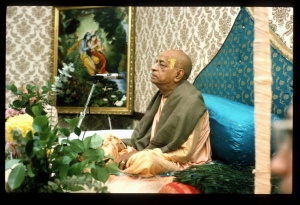SB 10.10.11: Difference between revisions
m (1 revision(s)) |
(Vanibot #0018 edit: make synonym terms in Sanskrit italic in SB - Vanisource) |
||
| Line 1: | Line 1: | ||
{{info | {{info | ||
|speaker= | |speaker=Nārada Muni | ||
|listener= | |listener=Nalakūvara and Maṇigrīva | ||
}} | }} | ||
[[Category:Srimad-Bhagavatam - Canto 10 Chapter 10]] | |||
[[Category:Bhagavatam Verses Spoken by Narada Muni - Vanisource|101011]] | |||
<div style="float:left">'''[[Srimad-Bhagavatam]] - [[SB 10|Tenth Canto]] - [[SB 10.10: Deliverance of the Yamala-arjuna Trees|Chapter 10: Deliverance of the Yamala-arjuna Trees]]'''</div> | |||
<div style="float:right">[[File:Go-previous.png|link=SB 10.10.10]] '''[[SB 10.10.10]] - [[SB 10.10.12]]''' [[File:Go-next.png|link=SB 10.10.12]]</div> | |||
{{RandomImage}} | |||
==== TEXT 11 ==== | ==== TEXT 11 ==== | ||
<div | <div class="verse"> | ||
dehaḥ kim anna-dātuḥ svaṁ | :dehaḥ kim anna-dātuḥ svaṁ | ||
niṣektur mātur eva ca | :niṣektur mātur eva ca | ||
mātuḥ pitur vā balinaḥ | :mātuḥ pitur vā balinaḥ | ||
kretur agneḥ śuno 'pi vā | :kretur agneḥ śuno 'pi vā | ||
</div> | </div> | ||
| Line 17: | Line 22: | ||
==== SYNONYMS ==== | ==== SYNONYMS ==== | ||
<div | <div class="synonyms"> | ||
''dehaḥ''—this body; ''kim anna-dātuḥ''—does it belong to the employer who gives me the money to maintain it; ''svam''—or does it belong to me personally; ''niṣektuḥ''—(or does it belong) to the person who discharged the semen; ''mātuḥ eva''—(or does it belong) to the mother who maintained this body within her womb; ''ca''—and; ''mātuḥ pituḥ vā''—or (does it belong) to the father of the mother (because sometimes the father of the mother takes a grandson as an adopted son); ''balinaḥ''—(or does it belong) to the person who takes this body away by force; ''kretuḥ''—or to the person who purchases the body as a slave; ''agneḥ''—or to the fire (because ultimately the body is burned); ''śunaḥ''—or to the dogs and vultures that ultimately eat it; ''api''—even; ''vā''—or. | |||
</div> | </div> | ||
| Line 24: | Line 29: | ||
==== TRANSLATION ==== | ==== TRANSLATION ==== | ||
<div | <div class="translation"> | ||
While alive, does this body belong to its employer, to the self, to the father, the mother, or the mother's father? Does it belong to the person who takes it away by force, to the slave master who purchases it, or to the sons who burn it in the fire? Or, if the body is not burned, does it belong to the dogs that eat it? Among the many possible claimants, who is the rightful claimant? Not to ascertain this but instead to maintain the body by sinful activities is not good. | While alive, does this body belong to its employer, to the self, to the father, the mother, or the mother's father? Does it belong to the person who takes it away by force, to the slave master who purchases it, or to the sons who burn it in the fire? Or, if the body is not burned, does it belong to the dogs that eat it? Among the many possible claimants, who is the rightful claimant? Not to ascertain this but instead to maintain the body by sinful activities is not good. | ||
</div> | </div> | ||
__NOTOC__ | |||
<div style="float:right; clear:both;">[[File:Go-previous.png|link=SB 10.10.10]] '''[[SB 10.10.10]] - [[SB 10.10.12]]''' [[File:Go-next.png|link=SB 10.10.12]]</div> | |||
__NOTOC__ | |||
__NOEDITSECTION__ | |||
Revision as of 11:52, 1 December 2017

A.C. Bhaktivedanta Swami Prabhupada
TEXT 11
- dehaḥ kim anna-dātuḥ svaṁ
- niṣektur mātur eva ca
- mātuḥ pitur vā balinaḥ
- kretur agneḥ śuno 'pi vā
SYNONYMS
dehaḥ—this body; kim anna-dātuḥ—does it belong to the employer who gives me the money to maintain it; svam—or does it belong to me personally; niṣektuḥ—(or does it belong) to the person who discharged the semen; mātuḥ eva—(or does it belong) to the mother who maintained this body within her womb; ca—and; mātuḥ pituḥ vā—or (does it belong) to the father of the mother (because sometimes the father of the mother takes a grandson as an adopted son); balinaḥ—(or does it belong) to the person who takes this body away by force; kretuḥ—or to the person who purchases the body as a slave; agneḥ—or to the fire (because ultimately the body is burned); śunaḥ—or to the dogs and vultures that ultimately eat it; api—even; vā—or.
TRANSLATION
While alive, does this body belong to its employer, to the self, to the father, the mother, or the mother's father? Does it belong to the person who takes it away by force, to the slave master who purchases it, or to the sons who burn it in the fire? Or, if the body is not burned, does it belong to the dogs that eat it? Among the many possible claimants, who is the rightful claimant? Not to ascertain this but instead to maintain the body by sinful activities is not good.